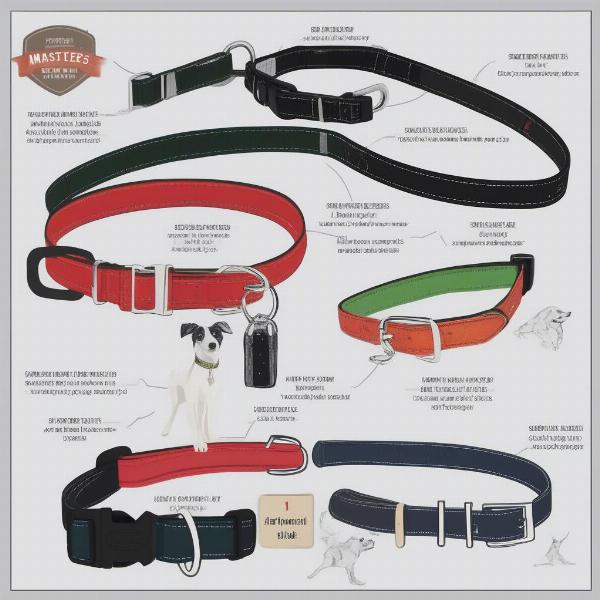A Masters dog collar, often associated with dog sports and training, signifies more than just a piece of equipment. It represents a commitment to communication, control, and connection between handler and dog. Whether you’re a seasoned competitor or a novice owner exploring training options, understanding the nuances of a Masters dog collar can significantly enhance your dog’s training journey. This guide delves into the various aspects of Masters dog collars, helping you choose the right one, use it effectively, and ensure your dog’s comfort and safety.
Choosing the right Masters dog collar involves considering several factors, including material, size, and intended use. Leather, nylon, and metal are common materials, each offering different benefits in terms of durability, comfort, and aesthetics. Sizing is crucial for both safety and effectiveness; a collar that’s too tight can restrict breathing, while one that’s too loose can slip off. The specific type of training or activity will also influence your choice. For example, a martingale collar might be suitable for everyday walks and basic obedience, while a slip collar might be preferred for more advanced training scenarios.
 Different Types of Masters Dog Collars
Different Types of Masters Dog Collars
Beyond the physical characteristics, understanding the philosophy behind a Masters dog collar is key to its successful implementation. It’s not about dominance or forceful control, but rather about clear communication and guidance. A Masters dog collar, when used correctly, provides a gentle yet effective way to convey commands and correct unwanted behaviors. It acts as an extension of your hand, allowing for subtle cues that your dog can learn to interpret and respond to. This nuanced approach builds trust and strengthens the bond between you and your canine companion.
Safety is paramount when using any type of dog collar, and the Masters dog collar is no exception. Always supervise your dog while wearing a collar, especially during training sessions. Regularly inspect the collar for signs of wear and tear, and replace it if necessary. Avoid using a Masters dog collar on puppies or dogs with delicate tracheas. Consult with a certified dog trainer for guidance on proper usage and to address any specific concerns you may have. They can help you tailor your approach to your dog’s individual needs and ensure you’re using the collar in a safe and effective manner.
What sets the Masters dog collar apart from other training tools? Its versatility. It can be used for a wide range of training activities, from basic obedience to advanced agility. This adaptability makes it a valuable tool for dog owners of all experience levels. However, it’s essential to remember that the collar is just one piece of the puzzle. Consistent training, positive reinforcement, and a strong bond with your dog are all crucial for achieving your training goals.
In conclusion, the Masters dog collar can be a valuable asset in your dog training toolkit. By understanding its various aspects, choosing the right type for your dog, and using it responsibly, you can enhance communication, improve control, and strengthen the bond with your furry friend. Remember, a Masters dog collar is not a magic solution, but rather a tool that, when used correctly, can facilitate effective and humane training.
FAQ:
- What is the best material for a Masters dog collar? The best material depends on your dog’s individual needs and the intended use. Leather is durable and stylish, nylon is lightweight and easy to clean, and metal is strong and long-lasting.
- How do I choose the right size Masters dog collar? Measure your dog’s neck circumference and add a few inches for comfort. Refer to the manufacturer’s sizing guide for specific recommendations.
- Are Masters dog collars safe for all dogs? No, they are not recommended for puppies or dogs with delicate tracheas.
- Can I leave a Masters dog collar on my dog all the time? It’s generally not recommended to leave any collar on a dog unsupervised for extended periods.
- Do I need professional training to use a Masters dog collar? While not strictly required, consulting with a certified dog trainer can be beneficial, especially for beginners.
- Can a Masters dog collar be used for everyday walks? Yes, certain types like martingale collars are suitable for everyday walks.
- How do I clean a Masters dog collar? Cleaning methods vary depending on the material. Refer to the manufacturer’s instructions for specific cleaning recommendations.
Related Articles
(No related articles found at this time.)
About ILM Dog
ILM Dog is your premier online resource for expert advice on dog care, training, and breed selection. We offer comprehensive guides, product reviews, and practical tips to help you navigate every aspect of dog ownership, from puppyhood to senior care. Whether you’re a seasoned dog owner or just starting your journey, ILM Dog provides the information you need to nurture a happy, healthy, and well-behaved canine companion. Contact us at [email protected] or +44 20-3965-8624 for personalized guidance.